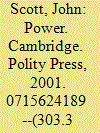| Srl | Item |
| 1 |
ID:
001692


|
|
|
|
|
| Publication |
London, Routledge, 1994.
|
| Description |
V.1-3 (xx, 424p.)
|
| Standard Number |
0415079381
|
|
|
|
|
|
|
|
|
|
|
|
Copies: C:3/I:0,R:0,Q:0
Circulation
| Accession# | Call# | Current Location | Status | Policy | Location |
| 041207 | 320.011/SCO;1-3 041207 | Main | On Shelf | General | |
| 041208 | 320.011/SCO;1-3 041208 | Main | On Shelf | General | |
| 041209 | 320.011/SCO;1-3 041209 | Main | On Shelf | General | |
|
|
|
|
| 2 |
ID:
049327


|
|
|
|
|
| Publication |
Cambridge, Polity Press, 2001.
|
| Description |
vi, 184p.
|
| Series |
Key concepts
|
| Standard Number |
0715624189
|
|
|
|
|
|
|
|
|
|
|
|
Copies: C:1/I:0,R:0,Q:0
Circulation
| Accession# | Call# | Current Location | Status | Policy | Location |
| 045111 | 303.3/SCO 045111 | Main | On Shelf | General | |
|
|
|
|
| 3 |
ID:
121356


|
|
|
|
|
| Publication |
2013.
|
| Summary/Abstract |
Although wood smoke pollution has been linked to health problems, wood burning remains a popular form of domestic heating in many countries across the world. In this paper, we describe the rhetoric of resistance to wood heater regulation amongst citizens in the regional Australian town of Armidale, where wood smoke levels regularly exceed national health advisory limits. We discuss how this is related to particular sources of resistance, such as affective attachment to wood heating and socio-cultural norms. The research draws on six focus groups with participants from households with and without wood heating. With reference to practice theory, we argue that citizen discourses favouring wood burning draw upon a rich suite of justifications and present this activity as a natural and traditional activity promoting comfort and cohesion. Such discourses also emphasise the identity of the town as a rural community and the supposed gemeinschaft qualities of such places. We show that, in this domain of energy policy, it is not enough to present 'facts' which have little emotional association or meaning for the populace. Rather, we need understand how social scripts, often localised, inform identity and practice.
|
|
|
|
|
|
|
|
|
|
|
|
|
|
|
|